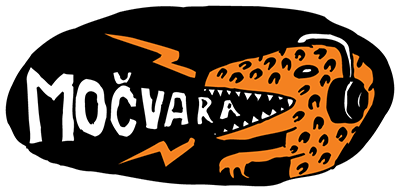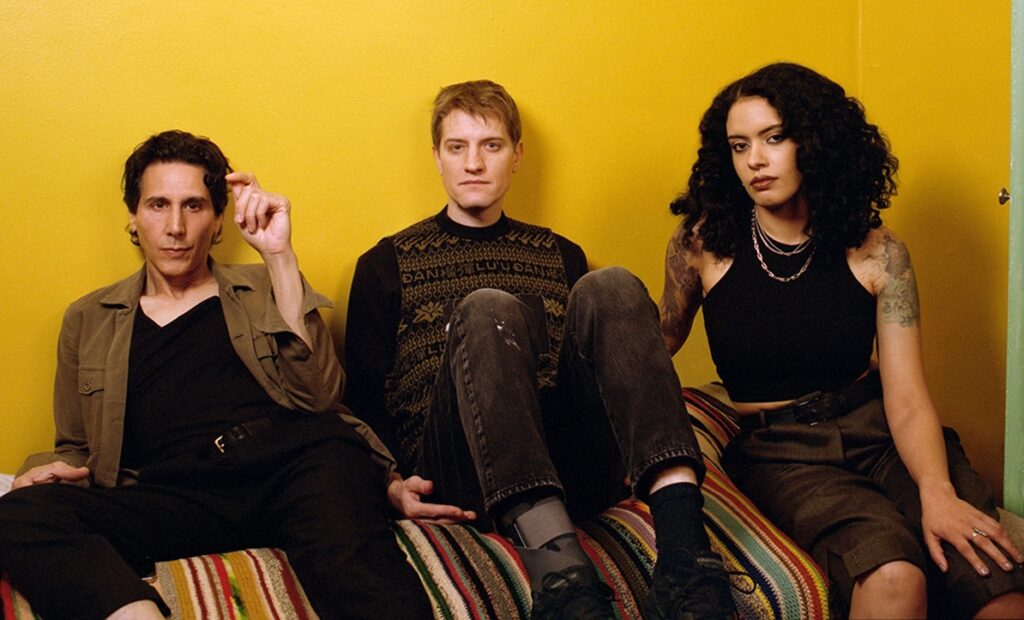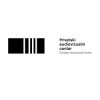Ahead of their performance at Močvara, The Wants shared a bit more about themselves, their music, how they do to connect with fans and even gave us homework: bands we should be listening to. Enjoy!
Q: Can you introduce each other to us?
MVV: Hi, I’m Madison Velding-VanDam.
YN: My name is Yasmeen (you can call me Yas).
JG: Hi, I’m Jason Gates.
Q: If you weren’t part of the music scene, what kind of work do you think you’d be doing instead?
MVV: I studied to be a lawyer. I could have gone down that path, but I’m glad I didn’t.
YN: I study physics and acoustics alongside playing music; I’d most likely be working somewhere in that space.
JG: In another world, I am a pediatric cardiac surgeon.
Q: Now that Bastard has been released, do you feel the album has changed you—perhaps in your artistic voice, or in how you approach songwriting or performance? If so, in what concrete ways?
MVV: The evolution is hard to articulate when you’re in the middle of it. I feel more confident now in how I approach writing and in integrating all of my interests.
YN: This is my first record with the band, so for me it feels natural. The performance of the new material is definitely heavier and more emotive, which I really appreciate.
Q: The sense of isolation—geographical, economic, societal—has been central to your lyrics and visuals. In a post-COVID, hyperconnected world, how has your perception of isolation evolved, and how is that reflected in your music today?
MVV: The hyperconnectivity of the pre-COVID world was stressful and overwhelming. Post-COVID, I sense a growing resentment toward constant connectivity. For me, isolation often comes from hyperconnectivity—it’s easy to feel small, lost, or detached from community when you’re exposed to such an endless stream of information and experiences. I admire artists who are grounding themselves in their own regions. That feels very powerful.
YN: I think the tech age mirrors big city life. The more people you live among, the less you feel like you stand out. Cities offer opportunities to live authentically, but they also come with loneliness—being surrounded by people while still being alone. The internet extends that dynamic: the whole world becomes your city, but do they really see you, or are you still alone? That sense of loneliness and being an outcast definitely runs through the album.
Q: In earlier interviews, you’ve spoken about American economic and political anxieties—class issues, “economically irrelevant” populations. How conscious are you of your audience’s socio-economic background, and does that awareness shape how you release music (formats, pricing, touring)?
MVV: We align ourselves with like-minded people. To me, that’s how I see change happening: slowly, by attrition.
Q: You’ve often reflected on social media, performance, and authenticity. In today’s streaming-driven world, how do you decide how much of your personal life and vulnerabilities to share with the public?
MVV: I prefer to share our art with the public rather than our personal lives.
YN: I like sharing music and political reactions with people online, but I don’t feel that sharing personal or private details adds anything positive.
JG: I mostly only talk about music and music production. It’s very rare that I’d bring up something too personal or political, though it has happened once or twice. I’m not very big on social media.
Q: Aside from performing, what do you do to stay connected with your fans?
MVV: We share visual art and recorded music. Madison Carroll has contributed enormously to our visual language through her photography.
YN: I love going to my friends’ shows and collaborating with other artists on videos and remixes. With fans, I stay connected directly on Instagram and TikTok.
JG: I like meeting people at shows and talking about music or other common interests.
Q: Which concert or venue do you remember most fondly, and why?
MVV: We had an incredible show at Loppen in Copenhagen on this tour. The crowd was fully present, dancing and letting go. That’s what it’s all about.
YN: Recently we played at Loppen in Copenhagen. It’s the best venue I’ve ever been to—amazing people and such a great crowd.
JG: I fondly remember seeing Swans at the Masonic Temple in Brooklyn when they got back together in 2010. It was my birthday, and my friend Yoshiko Ohara took me. Yoshiko used to have an incredible doom band called Bloody Panda. It was an amazing show.
Q: Are there any newer bands or artists you’d recommend right now?
MVV: YHWH Nailgun, Smerz, Hildur Guðnadóttir.
YN: I really like Activity—a great Brooklyn band with electronics and swirly guitars, produced by Jeff Berner (Psychic TV).
JG: I’m excited about an album called Defensive Acoustics, coming out October 10th from Liam Andrews under the name AICHER. He also has a band called MY DISCO and a project with Regis and Boris Wilsdorf, who works with Einstürzende Neubauten. A couple tracks are already up on Bandcamp.
I also recommend Goh Nakada’s project Gorgonn, which is awesome.
Q: If you could give one piece of advice to your younger self, what would it be?
MVV: It’s all in the journey. Get to it!
YN: Don’t judge yourself so harshly. Just make art and put it out.
JG: Don’t worry too much, and practice more.
Anita Ulovec (Volontiram u Močvari)




























